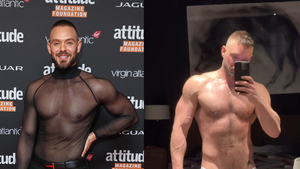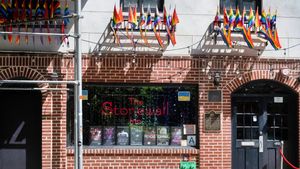Who gets to feel safe in public spaces in America -- and at whose expense? This question calls out to us from a spring and summer of violence and fear -- a short span of months that brought us North Carolina's "bathroom bill" and a mass murder of our people in Orlando; that took from us Alton Sterling, Deeniquia Dodds, and dozens of other black and transgender lives; that left many in our communities more aware than ever that, in Audre Lorde's words, "we were never meant to survive."
On March 23, the North Carolina legislature passed House Bill 2, which requires residents to use the public restrooms (in government buildings) corresponding to the gender assigned on their birth certificate. Supporters of the bill rallied outside the statehouse with preprinted signs bearing the slogan "Keep Women Safe." Soon after, the Rowan-Salisbury Board of Education issued a policy allowing students to carry mace and pepper spray to school for use against other youth who might be in the "wrong" restroom. As a board member explained to The Charlotte Observer, "Depending on how the courts rule on [HB 2], it may be a pretty valuable tool to have on the female students if they go to the bathroom, not knowing who may come in."
Beneath the call to defend women's safety, however, HB 2's provisions suggest a more complex agenda. In addition to regulating the use of public restrooms, the bill prohibits local governments from passing nondiscrimination ordinances or from raising the minimum wage (at a time when low-wage workers in the Fight for $15 are steadily winning such increases) -- provisions that were little advertised to the public before the bill's passage.
If this strategy sounds familiar, it is. Politicians have long used the idea of protecting (white, straight, cisgender) women's safety to justify limits on the civil rights or freedoms of others. This is the same rhetoric that Southern elected officials once used in ferocious defense of racial segregation in public schools and that some still use today to justify violent policing in communities of color.
The assumption underlying HB 2 -- that cisgender women need enhanced protection against transgender assailants in public spaces -- demands examination. As researchers at RTI International, a nonprofit research institute based in North Carolina, we believe that public policy should be based on sound evidence and the truth of people's lives, not on fear, hate, or hidden agendas. To take objective stock of what we know about violence, LGBTQ communities, and public spaces, we are reviewing the available research literature on this topic as well as some unpublished estimates from large-scale public health and criminal justice studies. Although prior research is very limited, we hope to understand:
* How do rates of violence victimization and perpetration among transgender people and other LGBTQ people compare to those in the general population?
* How safe are people in public spaces, such as restrooms, and how might feelings of safety in those spaces differ by gender identity?
* What doesn't the research tell us, and how can we begin to fill those gaps?
Answering these questions is a pressing task. Bills like HB 2 have already been introduced in Kansas, Mississippi, and Michigan, and 21 states are suing the federal government for directing that public school students may use the restrooms of their choice. North Carolinians and now Americans in many other states are being asked to take a position on an issue that many in the mainstream had never previously considered.
RTI aims to complete this work quickly and release our findings by this fall, offering communities across the country a firm grounding in fact to inform the policy decisions that they will face. In bringing research to bear on this issue, we have an opportunity to reject a tradition of fear- and hate-based lawmaking that has stood for far too long.
 TASSELI MCKAY is a social science researcher at RTI International with more than a decade of experience in public health research, particularly among marginalized communities. She is co-leading a study at RTI to better understand LBGTQ communities and violence in the United States.
TASSELI MCKAY is a social science researcher at RTI International with more than a decade of experience in public health research, particularly among marginalized communities. She is co-leading a study at RTI to better understand LBGTQ communities and violence in the United States.


 TASSELI MCKAY is a social science researcher at RTI International with more than a decade of experience in public health research, particularly among marginalized communities. She is co-leading a study at RTI to better understand LBGTQ communities and violence in the United States.
TASSELI MCKAY is a social science researcher at RTI International with more than a decade of experience in public health research, particularly among marginalized communities. She is co-leading a study at RTI to better understand LBGTQ communities and violence in the United States.

















































































